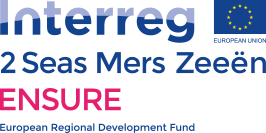ENSURE EU funding
About the grant
- Value of EU Grant to Kent County Council - €6.8 million
- Name of funding programme - Interreg 2 Seas Programme
The 2 year technological and social innovation ENSURE project will make use of the community peer to peer support, which will allow societies to become proactive in addressing circumstances which create vulnerability across Kent. It will involve every relevant party to look at approaches which provide results of empowerment to those who have become vulnerable due to their circumstances.
The project is a cross border partnership involving 9 organisations from across the UK, France, Belgium and the Netherlands. It has been approved and funded by the Interreg 2 Seas Programme (co-funded by the European Regional Development Fund) and has a budget of more than €6 million.
ENSURE will create a comprehensive model. The model will provide complete system redesign led by front line workers to break down existing professional silos as well as a bottom up peer-supporter approach. By acting at both levels simultaneously it will:
- reach people in a timely fashion
- reduce the cost to society of the bigger ‘labelled’ problems further down the line
- create less vulnerable communities
- prove support where ‘everybody counts’
- enable positive community development
- move people and their area from a downwards cycle to an upwards one.
Email ensure@kent.gov.uk for more information about the project.
Partners
Project partners
- Health and Europe Centre (United Kingdom)
- IGEMO (Belgium)
- Kent County Council (United Kingdom)
- HZ University of Applied Sciences (Netherlands)
- Antwerp University of Applied Sciences (Belgium)
- Community Centre ‘De Mussen’ (Netherlands)
- AFEJI (France)
- Goes City Council (Belgium)
- Community Arques (France).
Observer partners
- FNO Zorg voor Kansen (Netherlands)
- Verwey-Jonker Institute (Netherlands)
- Multicultural Woman Foundation of the Schilderswijk (Netherlands)
- First-line network organization of perinatal health (Belgium)
- Centre of perinatal expertise De Kraamvogel (Belgium).
Evaluation report
The results in the ENSURE project evaluation report (PDF, 888.1 KB), show that peer support can be an effective tool in increasing the trust relationships between vulnerable people and professional help, mediated by peer supporters.
Through ENSURE, professionals have regained awareness of prevailing stigmas about the vulnerable people which in turn helped to better understand the vulnerable target groups and encouraged unbiased viewing by the professional.
Project delivery
The ENSURE project has:
- finalised the peer to peer support model. The model can be implemented with different groups of people and can be instrumental in enabling social inclusion for people who, for whatever reason, may be vulnerable to or more likely to be socially excluded. The goal being that by enabling social inclusion for one group of people we can ensure social inclusion for subsequent generations. Read more about the peer to peer support model.
- created a new cost-effective, evaluated model to reduce and prevent vulnerability and the gap between people and state services. By building on partner De Mussen’s highly successful ‘Moms for Moms’ network of peer-to-peer community volunteers and linking 3 groups into a successful solution; professionals, peer supporters and vulnerable people.
- tested this model in a 12-month pilot training programme in partnership with Advocacy for All, for adults (18+) with autism in Kent. The pilot has focused on training people with lived experience to become peer supporters, who provide advice, guidance and encouragement to people who are experiencing similar challenges to the ones that they have experienced.
- provided resources for professionals supporting people with lived experience through 4 online training sessions delivered to organisations and the workforce. The training sessions included:
- an overview of the Ensure project
- how peer support can support social inclusion
- the challenges of running a peer support programme
- how we and Advocacy for All created a peer support programme for adults with autism.
